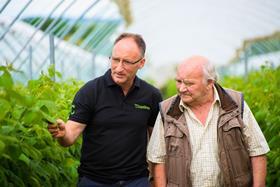
Independent berry grower Chambers, which produces soft fruit and stonefruit across 14 sites, has embarked upon a sustainability drive – both to protect the environment and give itself the best possible growing conditions.
Looking to balance economic considerations with conserving natural resources, the producer has already introduced a range of measures. These include:
- Installing solar panels on top of most of its packing facilities over the last three years. These generate 220,000 kWh of electricity a year;
- Recycling fruit waste at a local anaerobic digestor. The waste can be turned into a usable energy source and ploughed back into the national grid. Although this costs money, it is preferable to taking the waste to a local landfill site, Chambers says;
- Baling, recycling or reusing cardboard packaging from imported fruit;
- Working with a dedicated recycling company to launch a dry mixed recycling initiative. This will enable certain paper and plastic materials to be recycled;
- A retailer-driven move towards using recycled PET (a transparent thermoplastic) for fruit punnets. All non-recyclable black plastic punnets have been withdrawn, and Chambers says it is “constantly reviewing” alternatives to plastics, such as sugar cane, starch and cardboard pulp. The company says care needs to be taken to ensure that juice from the fruit doesn’t make the punnets less robust however. In addition, recycled plastic is being used for all plant pots, anddamaged polytunnel plastic is taken to a recycling facilty;
- Favouring the use of coir (coconut fibre) substrate as a replacement for peat;
- Using sensor-led lighting throughout the business and LED lighting in all new buildings;
- Investing in three new coldstore facilities in remote locations to maximise fruit quality and reduce waste;
- Harvesting rainwater from the roofs of all buildings and polytunnels, and storing it in tanks or field reservoirs to help irrigate the crops. This initiative has been in place for the last ten years, with some Chambers sites also featuring a natural borehole as a back-up water supply;
- Preserving local flora and fauna and planting native plants and hedgerows to attract bees and other wildlife. Bee boxes, insect ‘hotels’ and bird boxes are also being employed across various Chambers sites.
“As growers, we are only too aware of the importance of preserving the natural ecosystem and we take our responsibilities as custodians of some of the Earth’s finite resources extremely seriously,” says Chambers’ managing director Tim Chambers.
“The business has been focused on identifying new sustainable business practices way before it featured so heavily on the political agenda and we are constantly reviewing new strategies to reduce our carbon footprint and further improve our environmental impact.”






No comments yet